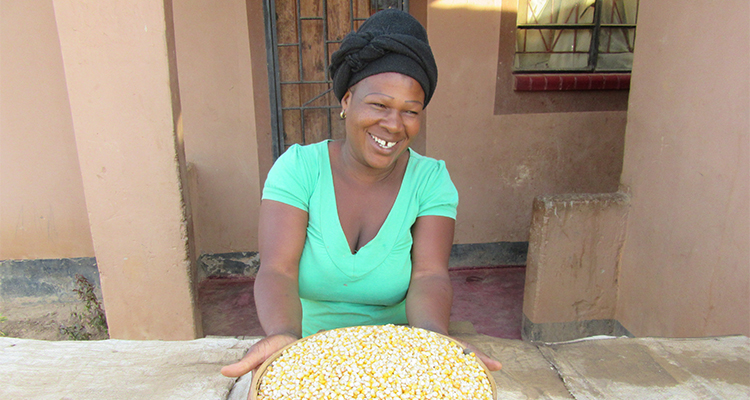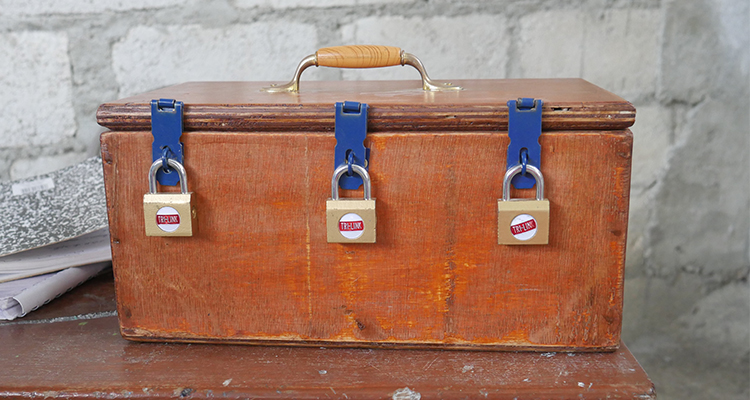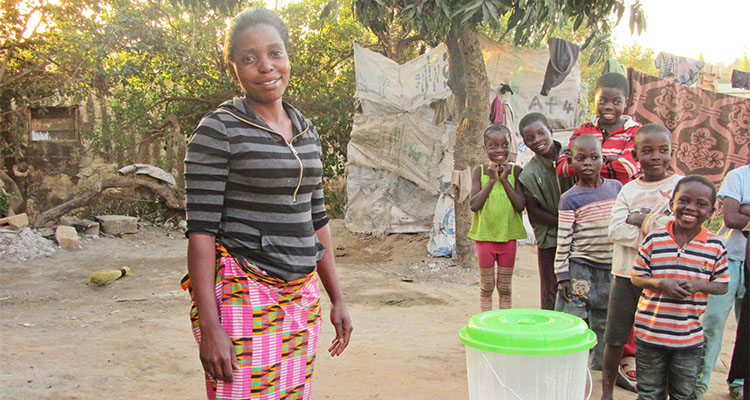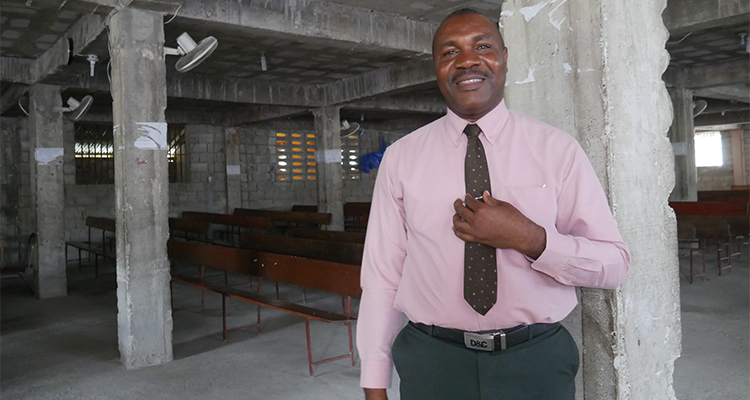Saving grace

In Lusaka, Zambia, a group stands in a dusty lot, saying their goodbyes against the backdrop of the setting sun. Each week, the same group of 20 comes together to support one another as a savings and credit association. The group is filled with the kind of energy that comes with a sense of hope for the future.
Susan Mwenda, a member of the group, hopes it can help revive her small business. In 2011, she began selling groceries, and business was good. Then, she and her husband could afford to provide for the basic needs of their four sons and a nephew who lives with them, including their school fees. That changed a couple of years ago when her business took a hit during a major downturn in Zambia’s economy. At that point, covering education costs for five children became difficult. With no free government schools in their area, the children would have to drop out of school if Mwenda and her husband couldn’t come up with the money for fees and supplies.
“I had a lot of pressure when the business came down,” Mwenda says. “I have been thinking day and night about how to boost my business.”
Going to a bank for a loan isn’t an option for Mwenda.
“I was thinking about going to the bank [to] borrow some money, but the fees will be too much,” she explains.
Like more than 2 billion people around the world, Mwenda doesn’t use formal banking systems. Even in areas where banks exist, such as Lusaka, they aren’t easily accessible because they charge high fees to keep a savings account open and require hefty collateral and high interest on even small loans. Without access to credit, making ends meet is difficult for individuals who don’t have opportunities for employment and must, therefore, rely on small businesses for income.

Families who don’t have a savings buffer are also especially vulnerable when emergencies strike. Any unexpected costs, such as medical care, can plunge a family deeper into poverty. Parents often have to choose between putting food on the table or sending children to school.
There are other informal savings and loan options in Zambia, but Mwenda insists her group is different. The other groups, “don’t care about one another,” she says. “If you go there, they won’t help you.”
Mwenda says she has confidence in her savings and credit association, which formed out of the local Nazarene church she attends, “because Jesus is the center of everything.”
She adds, “We share together and pray together, and because of that I have courage. With this group, we help each other because we are the church.”
Saving without shame
Nazarene churches in Zambia have partnered with HOPE International, a Christian microenterprise development organization, to create and train savings and credit groups. The partnership now serves more than 700 members in 48 groups through local Nazarene churches across the country.
HOPE’s model is a holistic approach that combines systems for savings and credit, financial and business training, and discipleship through Bible study and prayer.
Each week, groups of 15 to 20 individuals come together. The groups are self-selected and self-managed. They elect leaders and determine the minimum they’ll commit to save. In Mwenda’s group, each member adds at least 25 Kwacha (about US$2.75) in savings to a collective fund weekly.
Once the pot builds up, members can take out loans at reasonable interest rates, also determined by the group. Instead of going to a bank, the interest payments go back to the group, which increases the credit available for additional loans. At the end of each savings cycle, the accumulated interest is distributed to group members, thereby growing each member’s individual savings.
Through small loans, group members are able to start or expand small businesses. They are also afforded a safe place to save money.

According to member Abigail Liche, saving isn’t something that comes naturally in her culture.
“I have learned how to save without having shame to not give when those are in need around me,” she says. “Saving can be biblical, too, but it’s greed that causes harm.”
Liche and her husband care for their three children and three other children who live with them. Covering the cost of education for six children isn’t easy. Liche says she has trouble paying for clothes and food, let alone school fees.
“I struggle and my husband struggles because we get little,” she says. “[But] because of the savings group, I can send my children to school.”
Bernard Kazerbe echoes Liche’s experience.
“The church trained me to give, but I was not taught how to save,” he says. “This group has showed me a way to save and not feel guilty.”
Kazerbe came to Zambia as a refugee when violence made it impossible to remain in the Democratic Republic of the Congo. He says it was hard to save at home because he felt the need to give what he had to others who had needs. Now, though, he sees how saving can provide greater benefits in the long run.
Kazerbe has dreams of growing his business and “making it big.” He wants to meet the needs of his family, including his wife, their son, and six orphaned nieces and nephews; but he doesn’t want to simply focus on improving the lives of his family members.
“My heart is to help the people in my community,” Kazerbe says. “I want to start a business to employ the young men in the community to work and pay them. … Now that the savings group came, it gives me hope that I can accomplish this and help my community and the church.”

Raised up in dignity
Nazarene churches in Haiti have also been partnering with HOPE International to introduce savings and credit associations in their communities. There are currently 1,500 members in 72 groups from 47 Nazarene churches across the country.
“A lot of people around here live in poverty,” member Desir Myrtil says, explaining why he decided to join a group.
What he means is more than simply a lack of resources, though. While the groups do help people financially, Myrtil emphasizes the less tangible aspects of poverty.
“It’s not only money,” he says. “It’s the whole thinking thing. … The first thing is to help the person understand that he is able to do things.”
As groups come together, they discover how much they are capable of doing on their own, from increasing their savings to expanding or starting businesses. And as parents are able to provide for their children, their understanding of their God-given dignity grows as well.
Mercy Wilbert, a mother of two daughters and a son, says participating in her group has given her a boost of courage to face the future.
“It’s such a good thing,” she says. “The way we put together whatever we have—we put it together, and we are not scared. We are not afraid.”
Wilbert is a soft-spoken woman, but the group has affirmed her quiet leadership. She was elected secretary of her group.
“For me and my family,” she says, “I would like for God to raise us up in dignity.”
--Republished with permission from the Winter 2017 edition of NCM Magazine
